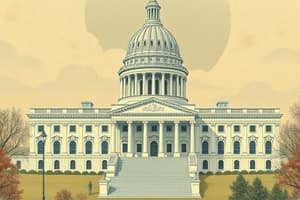Podcast
Questions and Answers
What is Article I?
What is Article I?
Section 1
What does the legislative branch of the government do?
What does the legislative branch of the government do?
The Legislative Branch makes the Federal laws.
What two houses make up Congress?
What two houses make up Congress?
The House of Representatives and the Senate
Which is the Upper House and which is the Lower House?
Which is the Upper House and which is the Lower House?
Define bicameral and unicameral.
Define bicameral and unicameral.
What is the length of term for a Representative?
What is the length of term for a Representative?
How is a representative elected?
How is a representative elected?
What are the qualifications of a Representative?
What are the qualifications of a Representative?
How is the number of representatives for each state determined?
How is the number of representatives for each state determined?
How many representatives in all? How many does California currently have?
How many representatives in all? How many does California currently have?
What is impeachment?
What is impeachment?
Who has the power to impeach?
Who has the power to impeach?
What is a census? How often is it taken? Why?
What is a census? How often is it taken? Why?
What happens if a Representative dies while holding office?
What happens if a Representative dies while holding office?
What is the 'Speaker of the House'? How are they chosen?
What is the 'Speaker of the House'? How are they chosen?
When are the normally scheduled elections for Representatives?
When are the normally scheduled elections for Representatives?
How many senators does each state get?
How many senators does each state get?
What is the term of office for a Senator?
What is the term of office for a Senator?
What are the qualifications of a Senator?
What are the qualifications of a Senator?
Flashcards
Article I of the Constitution
Article I of the Constitution
Outlines the structure and powers of the legislative branch, establishing Congress.
Congress
Congress
The legislative branch of the U.S. government, responsible for making federal laws.
Bicameral
Bicameral
A system with two houses in the legislature, such as the House of Representatives and Senate.
House of Representatives
House of Representatives
Signup and view all the flashcards
Senate
Senate
Signup and view all the flashcards
Impeachment
Impeachment
Signup and view all the flashcards
Qualifications for Representatives
Qualifications for Representatives
Signup and view all the flashcards
Census
Census
Signup and view all the flashcards
Representation by population
Representation by population
Signup and view all the flashcards
Speaker of the House
Speaker of the House
Signup and view all the flashcards
Senators' Qualifications
Senators' Qualifications
Signup and view all the flashcards
Term length for Representatives
Term length for Representatives
Signup and view all the flashcards
Term length for Senators
Term length for Senators
Signup and view all the flashcards
Special Election for Vacancy
Special Election for Vacancy
Signup and view all the flashcards
Total Representatives
Total Representatives
Signup and view all the flashcards
California Representatives
California Representatives
Signup and view all the flashcards
Electoral Process in November
Electoral Process in November
Signup and view all the flashcards
Filling Senate Vacancies
Filling Senate Vacancies
Signup and view all the flashcards
Accountability through Impeachment
Accountability through Impeachment
Signup and view all the flashcards
Study Notes
Article I Overview
- Article I of the Constitution outlines the structure and powers of the legislative branch of government.
- It establishes Congress, which is responsible for making federal laws.
Structure of Congress
- Congress consists of two houses: the House of Representatives (Lower House) and the Senate (Upper House).
- Bicameral system indicates a two-house legislature, while unicameral refers to a single-house legislature.
House of Representatives
- Representatives serve a term of two years.
- They are elected by the citizens of their respective states.
- Qualifications include being at least 25 years old, a U.S. citizen for seven years, and a resident of the state they represent.
- The number of representatives per state is determined by the state’s population, with each state guaranteed at least one representative.
- There are a total of 435 representatives, with California having the highest number at 53.
- Impeachment process is initiated solely by the House of Representatives.
Census and Representation
- The census, an official count of the population, occurs every ten years and helps determine congressional representation.
- If a representative dies while in office, the state governor is responsible for calling a special election to fill the vacancy.
Leadership in the House
- The Speaker of the House is elected by representatives to preside over proceedings.
- Elections for representatives typically occur on the first Tuesday after the first Monday in November during even-numbered years.
Senate
- Each state is allocated two senators, irrespective of population.
- Senators serve six-year terms, with specific qualifications: they must be at least 30 years old, a U.S. citizen for at least nine years, and reside in the state they represent.
- If a senator dies in office, protocols are in place for filling the vacancy, typically involving governor appointments or special elections.
Additional Key Information
- Impeachment serves as a mechanism to hold high-ranking officials accountable for serious misconduct, potentially leading to removal from office.
Studying That Suits You
Use AI to generate personalized quizzes and flashcards to suit your learning preferences.




